The experience of hosting my very own Thaal Pe Charcha
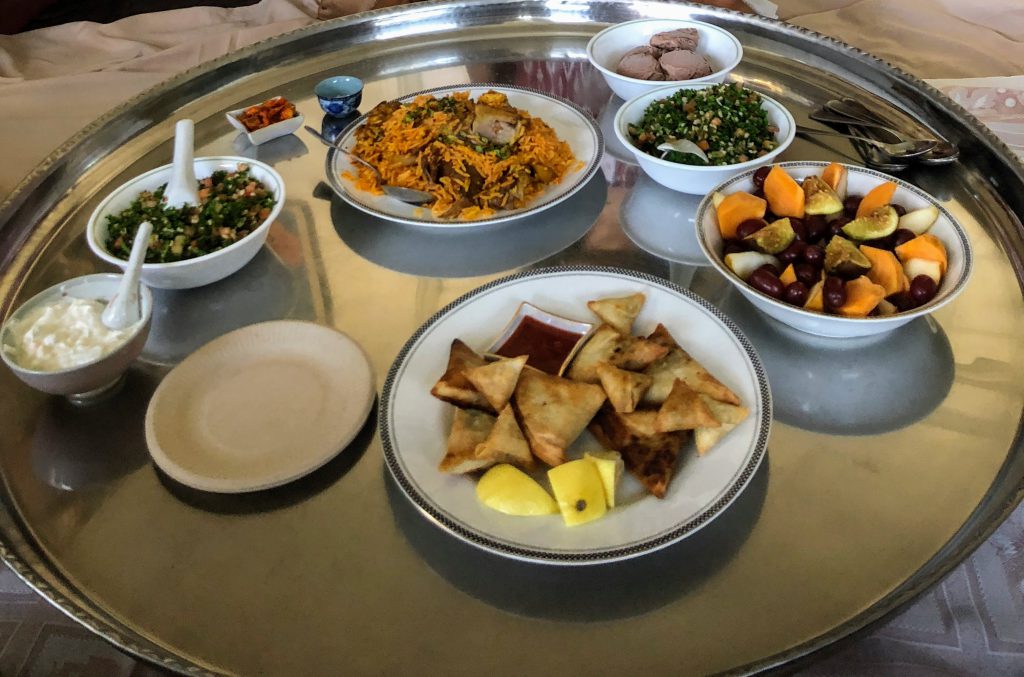
By Xenobia Country of Residence: India Earlier this year in January, I attended the Sahiyo’s Activist Retreat in Mumbai, where I met some brilliant, fantastic people from all walks of life. Women shared their experiences, stories and life-lessons, and talked about how female genital mutilation/cutting (FGM/C) had impacted their lives, either directly or indirectly, and what they were doing about it. Shortly after I returned home to Pune, my mind was filled with a bunch of ideas that involved reaching out to more Bohra women, hearing about their experiences with the community in general, and speaking to more women of substance. One of the training sessions at the Sahiyo Activist Retreat was on how to host one’s own ‘Thaal Pe Charcha’ (TPC, loosely translated as ‘discussions over food’). Representational photo of Thaal Pe Charcha cuisine Thaal Pe Charcha is a flagship Sahiyo program that brings Bohra women together in an informal, private space, so that they can bond over traditional Bohra cuisine while discussing FGM/C and other issues that affect their lives. I felt that the next logical step for me was to host my very own TPC. It would give me the opportunity to meet and talk to more women from my city about certain community-centric issues that affect all our lives. Even though I have never really been an activist myself, I knew of Sahiyo, and the cause that they have been fighting for. I admired and respected them, and I had silently been fighting for the same cause all my life, too. Did I have my fair share of apprehensions? I absolutely did. And why wouldn’t I? In a closely-knit community like ours, where one person’s word is law, it is so hard to try to reason with women and mothers, to give them more clarity by pleading with them to not hurt their children. Often, they never seem to be able to see beyond how you are “going against the community” or “against Moula”, even though the point has never been about that. There is a fine line between following someone and blind faith. No matter which country you are in, child abuse is still child abuse, irrespective of what you choose to call it or who performs it. For my TPC, I managed to invite a few women for lunch – a mix of friends, cousins, acquaintances and colleagues. It was also the first time I had ever hosted a Bohra get-together by myself, without the usual family members around to really help me. So for me, that itself was a personal milestone. Strangely, I felt it brought me a step closer to warmly embracing other nicer aspects of our culture – getting people together, bonding over food, and discussing the many facets of our little world. The conversations bordered around what each one was doing in their lives, professionally and otherwise. We discussed issues such as soft-feminism, journalism, opinions on certain movies and the debate on whether wives should take their husbands’ surnames after they are married. For a couple of the women who attended, FGM/C was a new concept they had never spoken about before. They asked questions about why it is performed, when they heard of it, and why we needed to stop practicing it on the next generation, especially since conversations around this topic have always been taboo for some strange, secretive reason in our community. The younger minds agreed that all customs with no solid reasoning usually always die a natural death, because no one likes doing things without a valid reason. Having access to the right answers and accurate information definitely helped each of them in getting more clarity on the topic, even though not every single person wanted to necessarily talk about their personal experience. It is still daunting to talk about something so personal in front of a bunch of strangers. But for me personally, it was important that the topic was at least touched upon, so that other women realise that this is a safe, non-judgemental place and that they could reach out to me if they wanted to speak about anything that bothered them at all. Apart from that, I do enjoy bringing new people together and nurturing relations with those I care about. So all in all, this was extremely special to me. While this event was still pretty small-scale, I would love to host and be a part of bigger TPCs eventually, where more women can come together and share their stories, opinions and ways to raise awareness about the harms caused by the practice in question, and how we can all work together to promote the abandonment of FGM/C and save the many generations of girls and women in the future from physical, mental, emotional and psychological damage.
California Thaal pe Charcha allowed me to share my experiences through storytelling
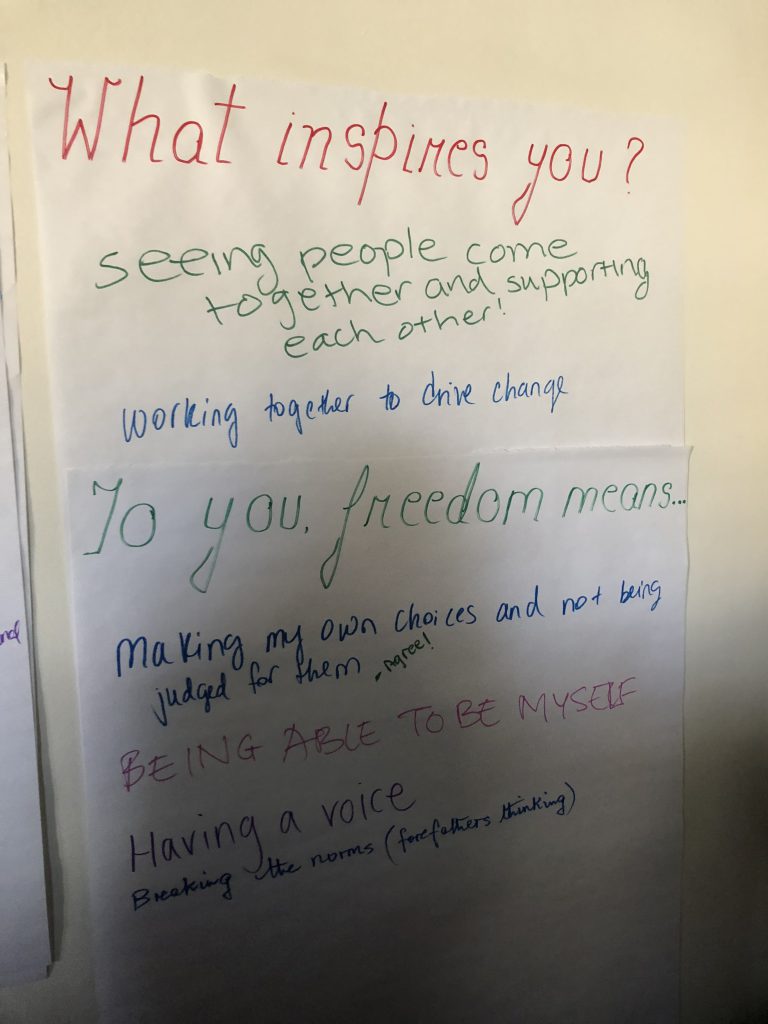
By Anonymous I grew up in India, and when I moved to California a few years ago, I didn’t know anybody from the Bohra Jamaat (congregation). The Sahiyo ‘Thaal pe Charcha’ event came at a time in my life when I had been thinking a lot about sharing through storytelling. What a powerful tool it is to get people together and find ways to let go, heal and learn from our shared experiences. Sitting in a room full of Bohra women, sharing a meal in a thaal (a large circular steel dish), and exchanging laughs and a few cries too, I felt a strong sense of belonging. I soon learned that we all had very different upbringings outside of our Bohra lives, yet very similar experiences as women within the community. My mother had her storytelling circle − her group of women friends who met once a month at each other’s homes, shared a meal together and talked about their lives. She always came back from those gatherings with a glow on her face, as if a heavy burden had been lifted off her shoulders. She felt safe within that group, and the group was built on trust, love, respect, and compassion for each other. As one of the facilitators of the California Thaal pe Charcha event, I was hoping to create a similar space for all our participants. I knew it would be a challenge since this was the first time we were all meeting, and it takes time to build trust and friendship. But it was heartwarming to see everyone feel so comfortable right from the beginning. The rest of the afternoon was full of rich and insightful discussions about what it meant to grow up Bohra in California, the multiple lives and identities that a woman has to balance, what we value about the community, the pressures, daily challenges and barriers that women faced within the community. Interactive activities throughout the afternoon allowed participants to share something unique about their lives, and think about what community and freedom meant to them. And just when we needed a break to take in a few deep breaths, and process everything that we had discussed, we were treated to a hot cup of ‘chai’ that warmed our hearts and minds! We ended the afternoon with many questions, dreams, and hopes in our minds. And I think that is the magic of such gatherings. It pushes us outside our comfort zones but allows us a space to share, to feel important, to know that our voices, our thoughts, and perspectives are appreciated and heard, and most importantly, a reminder, that we are never alone. I look forward to many more gatherings where we can learn and grow together. Read more reflections on the Bay Area TPC here!
Thaal Pe Charcha Launches in California
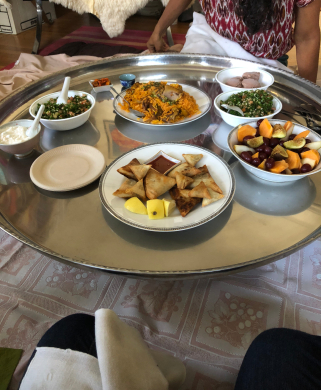
On Oct 21st in Berkeley, CA, a team of Sahiyo activists organized the first California Bay Area Thaal Pe Charcha (TPC). This Sahiyo flagship program allows Bohra women to come together in a private, informal setting so that they can bond over food and discuss issues that affect their lives, like Female Genital Cutting or Khatna. The program started in Mumbai, India in 2017 and is being piloted in the United States in 2018 in New York and California. For the organizers of the California Bay Area TPC, the weeks leading up to the event were full of excitement and anticipation for what they hoped would be the start of new friendships in the Bay Area. This is what one organizer, Sabiha Basrai, has to say about the program: “Sharing space with an inter-generational group of Bohra women was healing and inspiring. I was able to embrace my Bohra identity in a new way and celebrate the special bonds that we build in our community, take pride in our cultural and religious history, and of course, enjoy a shared meal around a thaal. It is difficult to talk about the patriarchy that exists within our jamaats and I am grateful that TPC created a safe and confidential space to hear each other’s stories and to remind one another that we are not alone in these struggles. We are all figuring out how to practice our faith with feminist values. This means challenging certain social norms that are oppressive to women, such as khatna or female genital cutting while recognizing that empowering women is a very Muslim thing to do. I am grateful for the patient and supportive work of Sahiyo and look forward to the continued work bringing about gender justice in our communities.”
Why I co-hosted a Sahiyo ‘Thaal pe Charcha’ lunch in New York
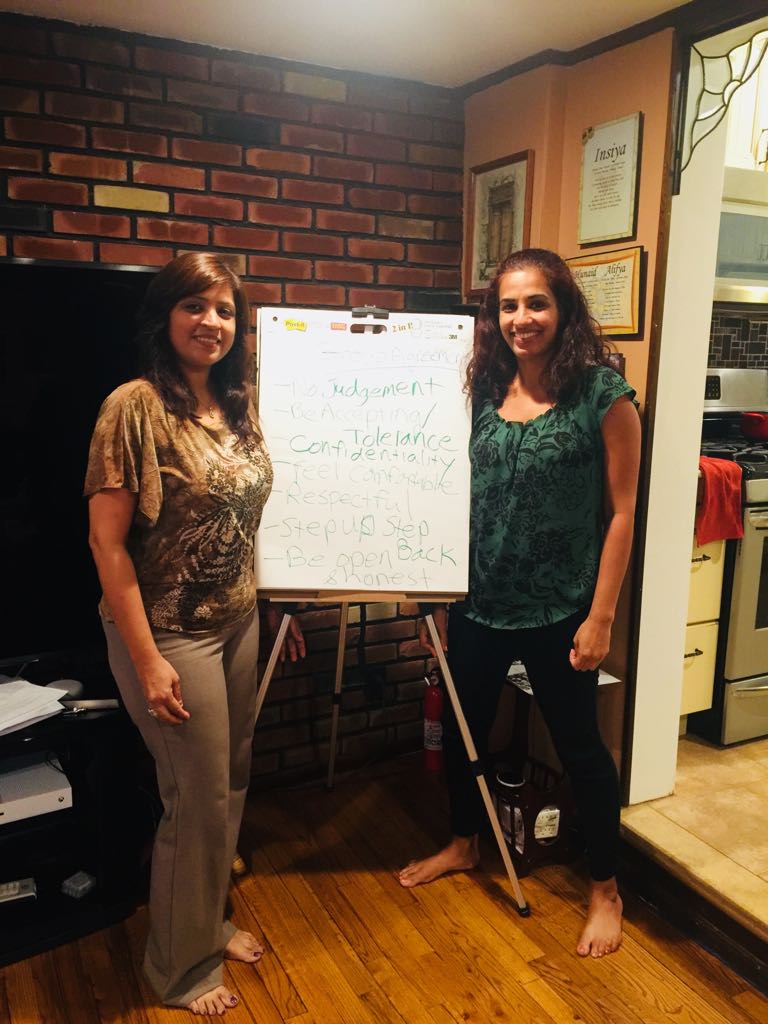
By Alifya Sulemanji I had been hearing about Thaal pe Charcha (TPC), an event organized by Sahiyo, on a regular basis in Bombay India and it seemed like a very interesting concept to me. I felt inspired to host one at my home and bring together New York Bohra women for such an event. I reached out to few friends and acquaintances who I thought would be interested in being a part of this inaugural Thaal Pe Charcha event in the United States, and who would feel comfortable opening up about their daily lives. One aspect about TPC that I found very vital is that the event is about creating a safe space where people can speak openly without fear of reprisal for their beliefs. I assured the women who attended that the TPC at my house would be a safe environment where we could speak openly about issues like Khatna (Female Genital Cutting), Iddat, and other topics that can negatively impact women in our community. We all also agreed that there were some very good things about the Bohra community that we all appreciated, such as the feeling of community, the food, and the mannerisms also known as ‘Adab’ in Gujarati and ‘Tehzeeb’ in Urdu that helps guide our lives, such as food and eating etiquette, how we dress, how to be respectful, how to keep your house, cleanliness, and how you treat others. Yet, even with Adab, there certainly is a wide range of thought amongst the Bohra community regarding how strict certain rules and cultural activities must be, which at times can be oppressive as well. After hosting this first TPC, a personal hope of mine is that the women and I will form strong relationships and trust with one another so together we can take action to change the parts in our community we find harmful. I hope we will continue to organize more events like these in the future and form a supportive group of friends who will stand by one another. Are you interested in hosting a Sahiyo Thaal Pe Charcha event in your own city or town in the U.S.? If yes, get in touch with Sahiyo at info@sahiyo.com”
Miti sitabi: Sahiyo hosts a special edition of Thaal pe Charcha in Mumbai
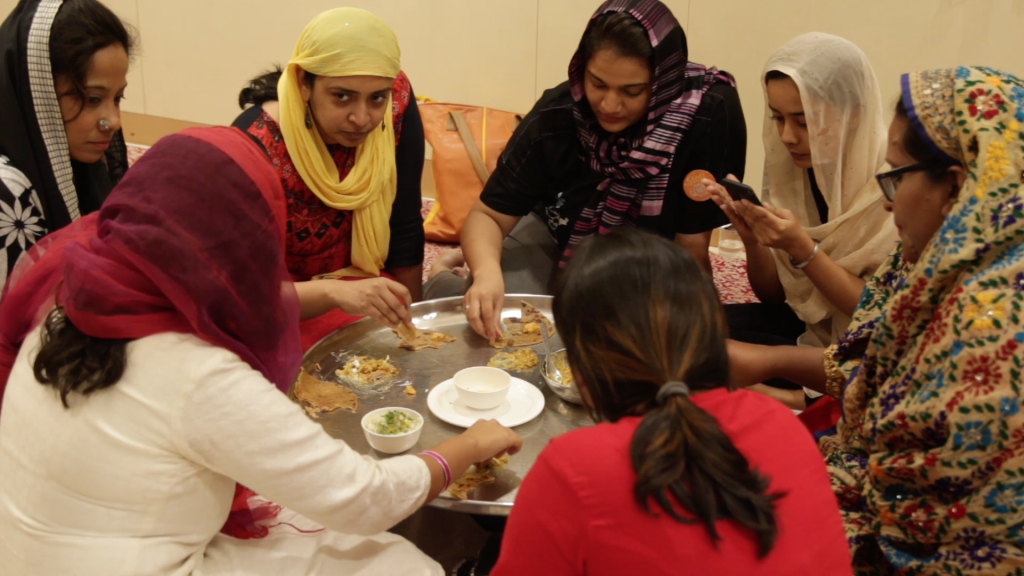
Sahiyo’s fifth Thaal pe Charcha event in Mumbai on April 7 was perhaps its most special one so far. On popular demand by the regular participants of the group, this Thaal pe Charcha was a miti sitabi — a special women’s meal hosted in honour of the Prophet’s daughter, Ma Fatema. At Sahiyo’s event, this special meal was hosted as a tribute to those Bohra girls who were not allowed to participate in miti sitabis if they were not circumcised. Thaal pe Charcha, which loosely translates as “discussions over food”, is a Sahiyo flagship programme that brings together Bohra women and men in a safe space to share their feelings, experiences and views on Female Genital Cutting or khatna, while bonding over traditional Bohra food. This programme began in February 2017 with a group of 16 Bohra women and now has more than 30 women and men associated with it. The April 7 Thaal pe Charcha had 21 of those participants, including five men. In fact, while there were two women-only thaals (traditional large dishes for seating 8 people) for the miti sitabi meal, this was the first time that a group of Bohra men had their own historic miti sitabi thaal. The meal began with traditional jaggery and roti, which is eaten at the start of every miti sitabi. At the end of the meal, participants completed the traditions by applying henna, perfume and small gifts with each other. The only tradition that this miti sitabi did not follow was that of khatna, of using khatna as a definer of who a true Bohra is and who gets to sit at special community thaal events. This miti sitabi was open to all. At the Thaal pe Charcha event, participants also shared stories about their journeys after they started speaking out about FGC. One participant, who was attending a Thaal pe Charcha for the first time, talked about how she resisted family pressure and managed to spare her younger daughter from the cut, even though she could not save her older daughter. Another participant shared her experience of having a khatna discussion with her father, who was convinced that FGC was mandated by the Shariat. However, after she had a heartfelt conversation with him, her father acknowledged the pain she had been put through and apologised to her. Participants concluded the Thaal pe Charcha with a lively discussion on other kinds of social norms, besides khatna, that patriarchal communities use to repress women.
Here I am, sharing my story: Watch a Dawoodi Bohra woman narrate her Khatna experience
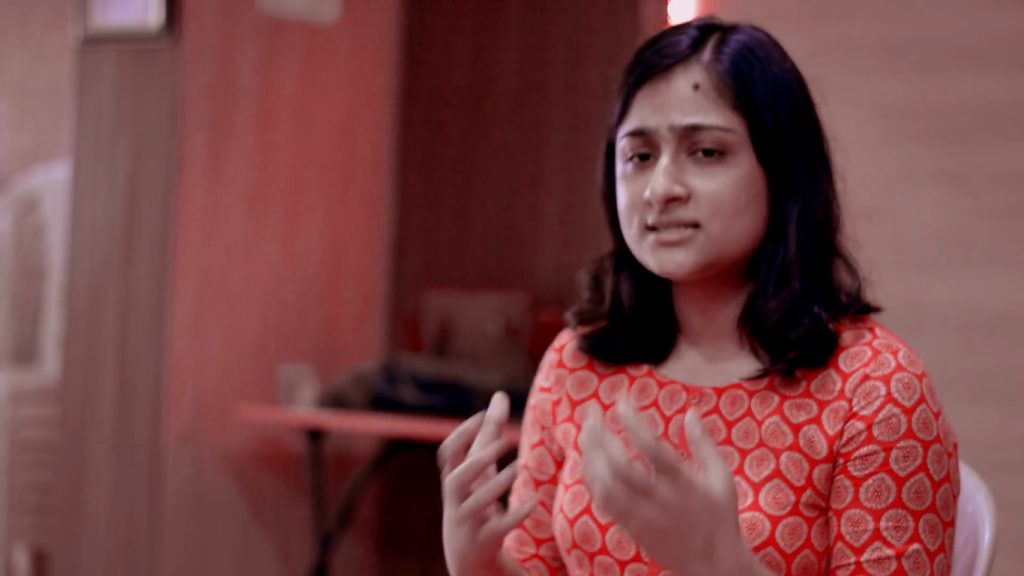
In October 2017, at Sahiyo’s third Thaal Pe Charcha event, a young Indian Bohra woman, Saleha Paatwala, shared her experience of being subjected to “khafz” — also known as khatna or Female Genital Cutting — with the other participants. On this International Day of Zero Tolerance towards Female Genital Cutting (FGM/C), watch this poignant video (below) of Saleha narrating her story. “When I was cut, I didn’t even know what part of me was taken away by them, and for what. I was just a 7-year-old girl then. I remember the pain of that ‘nick’, the embarrassment of lying naked in front of those women, and those goosebumps when they touched my private part,” said Saleha, explaining why she chose to speak out. “By sharing my story, I hope to reach out to those who have suffered and can’t find their voices, to those who are unaware of this practice and most importantly, to those who can help us eradicate FGM/C completely from our country.” [youtube url=”https://youtu.be/JZSpb9RVqFQ”]
At Sahiyo’s third Thaal Pe Charcha, Bohra men attended too

In October 2017, Sahiyo hosted Thaal Pe Charcha (loosely translated as ‘discussions over food’) for the third time, with 22 participants from the Bohra community. Thaal Pe Charcha is a flagship Sahiyo programme that brings Bohra women together in an informal, private space so that they can bond over traditional Bohra cuisine while discussing Female Genital Cutting and other issues that affect their lives. While Sahiyo’s first two TPC events were open only to women participants, the October event included 15 women as well as three men from the Bohra community in Mumbai. Most of the women who participated in the event had already attended the previous two TPC events held in February and July. With this third event, their comfort level in discussing FGC had grown. These women also brought their friends, cousins, and other relatives to join in on the discussion. Some women expressed that they had cautiously begun speaking about FGC with their families, friends, and spouses, which they had never done earlier. The women also spoke with their spouses about not performing FGC on their daughters. The new women participants were able to clear some of their doubts about FGC and asked questions about why it is performed and why we need to stop practicing it on the next generation. Conversations about FGC have always been taboo and secretive in the community, so being in a safe and intimate space at the TPC helped the women discuss it openly. By listening to the stories and concerns of the women, the men who attended the Thaal Pe Charcha were able to get a deeper understanding of how the practice affects women. They were very open to discussing FGC and even suggested several ways to raise further awareness about the harms caused by the practice and how to promote the abandonment of FGC. One of the highlights of the event was having one of the women participants, Saleha, share her story of undergoing FGC. After listening to Saleha’s story, a few women and men were in tears. Some women said they experienced flashbacks to their own experience of undergoing FGC. Saleha sharing her story helped make other women feel comfortable talking about their own FGC experiences. Many women’s stories were similar in terms of how the cutting occurred, how they felt anger, fear, shame, depression, and a sense of being cheated by those they trusted. Over lunch, men and women continued their discussion on FGC, as well as other various issues occurring within the Bohra community. Participants also discussed ways in which they could all work at the grassroots level to raise awareness about ending FGC.
દાઉદી બોહરા મહિલાઓ માટે ‘સહિયો’એ યોજ્યો દ્વિતીય ‘થાલ પે ચર્ચા’ કાર્યક્રમ
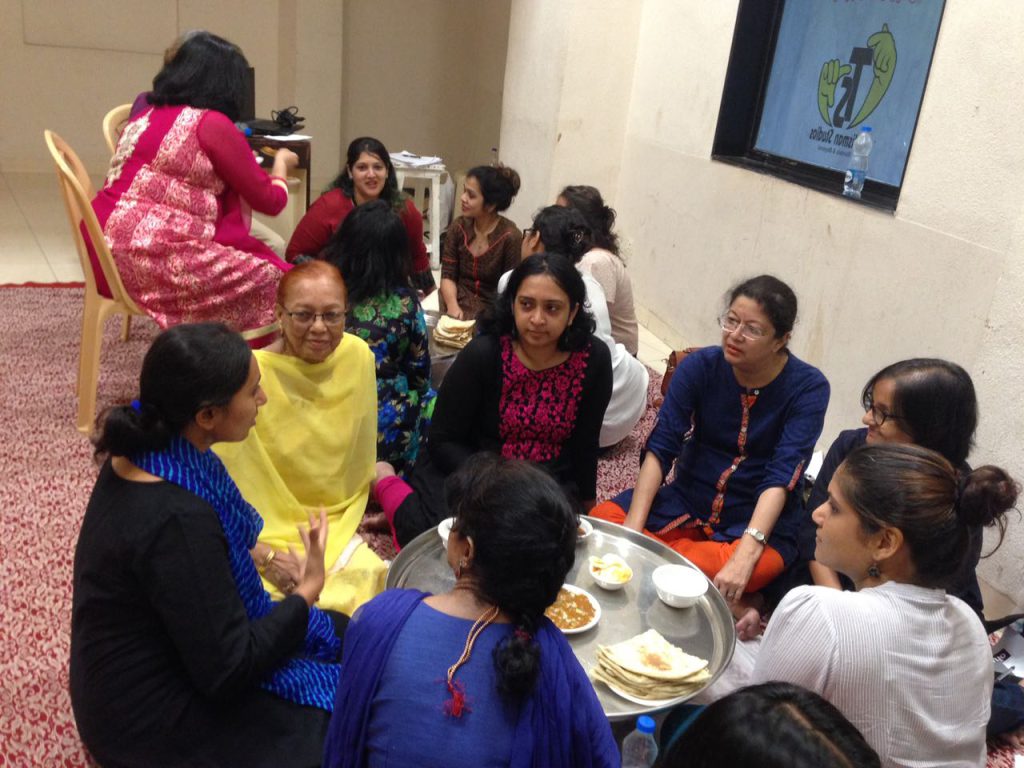
ગત પહેલી જુલાઈએ ‘સહિયો’એ તેનો દ્વિતીય ‘થાલ પે ચર્ચા’ કાર્યક્રમ યોજ્યો હતો. દાઉદી બોહરા સમુદાયની ૨૦ મહિલાઓએ આ કાર્યક્રમમાં હાજરી આપી હતી. ‘થાલ પે ચર્ચા’નો સામાન્ય શબ્દોમાં ‘ભોજન કરવાની સાથોસાથ ચર્ચા’ તરીકે થાય છે. ‘સહિયો’નો આ ફ્લેગશિપ કાર્યક્રમ છે, જેમાં બોહરા મહિલાઓને ખાનગી, અનૌપચારિક વાતાવરણમાં ભેગી કરાય છે, જેથી તેઓ ભોજન કરતી વખતે એકબીજાની સાથે સંબંધ બાંધે અને FGC (ફિમેલ જેનિટલ કટિંગ) અથવા ખત્ના/ખફઝ જેવી તેમના જીવનને અસર કરતી સમસ્યાઓની ચર્ચા કરી શકે. ‘સહિયો’નો પ્રથમ ‘થાલ પે ચર્ચા’ કાર્યક્રમ ફેબ્રુઆરીમાં યોજાયો હતો અને તેમાં વીસ અને ત્રીસ વર્ષથી મોટી વયની મહિલાઓએ હાજરી આપી હતી. આ વખતના કાર્યક્રમમાં તમામ વય જૂથોની મહિલાઓએ હાજરી આપી હતી, જેમાં સૌથી યુવાન મહિલા ૧૮ વર્ષની હતી જ્યારે સૌથી જઈફ ૭૪ વર્ષના હતા. આ મહિલાઓમાં વિદ્યાર્થિનીઓ, નોકરિયાત વ્યવસાયીઓ, ગૃહિણીઓ તથા એક પ્રૅક્ટિસિંગ ડૉક્ટરનો પણ સમાવેશ થતો હતો. આ ઉદારવૃત્તિ ધરાવતાં મિશ્રણો, દાઉદી બોહરા સમુદાયમાં પ્રવર્તમાન અતિ-ચર્ચિત ખત્ના પ્રથા વિશે, વિભિન્ન વસ્તીઓ ફરતે મહિલાઓની વિચાર પ્રક્રિયાઓનો તાગ મેળવવાની ‘સહિયો’ને તક પૂરી પાડી હતી. પરિચય કરાવનારા સત્રની સાથે આ કાર્યક્રમ શરૂ થયો હતો અને ત્યાર બાદ પ્રિયા ગોસ્વામીની ફિલ્મ ‘એ પિન્ચ ઑફ સ્કિન’ દર્શાવાઈ હતી. સ્વાદિષ્ટ, પરંપરાગત થાળ ભોજન પીરસાયું હતું અને ખત્ના વિશે મહિલાઓના વિચારોની ખુલ્લા મંચ (ઓપન કોરમ)ની ચર્ચા યોજાઈ હતી. આ સદીઓ જૂની પરંપરાના પોતાના અનુભવો વિશે વાત કરતી વખતે મહિલાઓને ભાવુક બનેલી જોઈને હિંમત સાંપડી હતી. અમુક મહિલાઓએ તેમની દીકરીઓની ખત્ના કરાવવા બદલ અફસોસ વ્યક્ત કર્યો હતો. અન્ય મહિલાઓએ જણાવ્યું હતું કે જો તેમને પસંદગી કરવાની તક મળે તો, આ અત્યંત દુઃખદાયક રીવાજ અને તેના લાભ અને ગેરલાભ વિશે કેળવણી પામવાનું તેમને ગમશે અને કદાચ તેમની પુત્રીઓની ખત્ના કરાવવાથી તેઓ દૂર રહેશે. આ કાર્યક્રમનું મુખ્ય આકર્ષણ નિશ્ર્ચિત્તપણે ૭૪ વર્ષીય વૃદ્ધા હતાં જેમણે તેમની પુત્રીની ખત્ના થવા નહીં દે, એવું સુનિશ્ર્ચિત્ત કરવા વર્ષો અગાઉ પરંપરાઓને પડકારી હતી. (This report was originally published in English on August 16, 2017. Read the English version here.)
Sahiyo hosts its second Thaal Pe Charcha event for Bohra women

On July 1, Sahiyo conducted its second ‘Thaal Pe Charcha’ event which was attended by 20 women from the Dawoodi Bohra community. Thaal Pe Charcha (TPC), which loosely translates as “having discussions while eating food”, is a flagship Sahiyo programme where Bohra women are brought together in a private, informal setting so that they can bond over food and discuss issues that affect their lives, like FGC or Khatna. Sahiyo’s first TPC was held in February with women in their 20s and 30s. This time, participants included women from all age groups, the youngest being 18 and the oldest 74 years of age. The women included students, working professionals, home-makers, and also a practicing doctor. This eclectic mix gave Sahiyo an opportunity to gauge the thought processes of women across different demographics, on the much-debated practice of Khatna within the Dawoodi Bohra community. The event was kicked off with an introductory session, followed by a film screening of Priya Goswami’s ‘A Pinch of Skin’, a delicious, traditional thaal lunch, and an open forum for women to discuss their thoughts about Khatna. It was heartening to see the women get emotional while speaking about their experiences of this age-old tradition. Some expressed regret at having done Khatna on their daughters. Others said that if given a choice, they would want to be educated about this ritual, its pros and cons, and perhaps refrain from doing it to their daughters. The highlight of this event was definitely the oldest participant, a 74-year-old woman who defied traditions years ago to ensure that her daughter was not cut. To view more pictures from Thaal Pe Charcha, check out our Facebook Album. Read the Gujarati version here.
Thaal Pe Charcha
Thaal Pe Charcha Thaal Pe Charcha, which loosely translates as “discussions over food”, is a unique program by Sahiyo to bring survivors and community members together in safe spaces, where they can discuss and learn about FGC while bonding over food. Thaal Pe Charcha (TPC) has been a flagship program of Sahiyo’s work in India since 2017. It harnesses the power of one of the most cherished parts of Dawoodi Bohra culture – eating a traditional meal from the “thaal”, a large round plate that can seat eight people around it. Sharing a thaal meal helps to break barriers, making it easier to have difficult and personal conversations on a topic as sensitive as Female Genital Cutting or Khatna. TPC events are organized in private, safe spaces where women and men from the community can come together, share their stories and feelings about Khatna, support each other, ask questions, discuss the nuances of FGC and find common ground to work collectively towards ending the practice. And of course, they also share a traditional Bohra thaal meal! Since 2017, Sahiyo has organized 13 Thaal Pe Charcha events in Mumbai and Pune, India, reaching over 65 participants. Some of our regular participants have also hosted their own Thaal Pe Charcha events at their homes, to take the message forward. If you are interested in participating in a TPC event or hosting one at your home, reach out to us at chandni@sahiyo.org Read about our past TPC events below: Thaal Pe Charcha – Feb 2017 Thaal Pe Charcha – July 2017 Thaal Pe Charcha – October 2017 Thaal Pe Charcha – January 2018 Thaal Pe Charcha – April 2018 Thaal Pe Charcha – August 2018 Thaal Pe Charcha – November 2018 Thaal Pe Charcha – April 2019 (Pune) Thaal Pe Charcha – May 2019 (Ramzan special) Thaal Pe Charcha – February 2020 Thaal Pe Charcha – July 2020 Thaal Pe Charcha – October 2020
